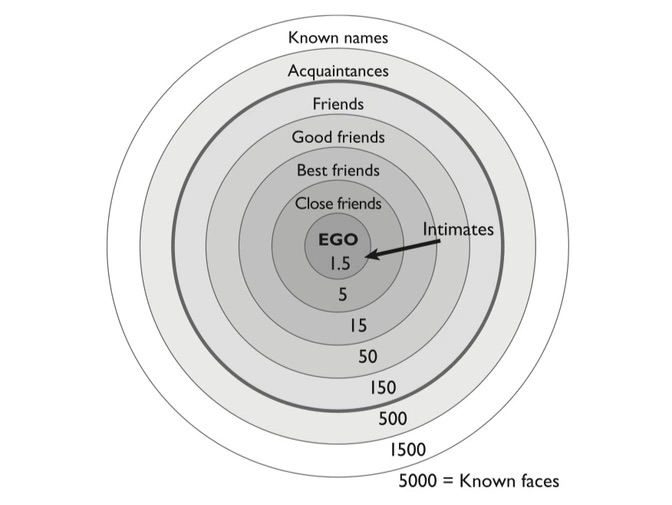this post was submitted on 01 Sep 2023
977 points (93.7% liked)
Technology
63283 readers
5018 users here now
This is a most excellent place for technology news and articles.
Our Rules
- Follow the lemmy.world rules.
- Only tech related content.
- Be excellent to each other!
- Mod approved content bots can post up to 10 articles per day.
- Threads asking for personal tech support may be deleted.
- Politics threads may be removed.
- No memes allowed as posts, OK to post as comments.
- Only approved bots from the list below, to ask if your bot can be added please contact us.
- Check for duplicates before posting, duplicates may be removed
- Accounts 7 days and younger will have their posts automatically removed.
Approved Bots
founded 2 years ago
MODERATORS
you are viewing a single comment's thread
view the rest of the comments
view the rest of the comments
Interesting, thanks for the response. Robin Dunbar is a psychologist and anthropologist who studies friendship. His claim to fame is 'Dunbar's Number' which is a general statement of how many friends a person can have. It varies from person to person and is influenced by one's environment, age, beliefs, etc.
He has a way of expressing how relationships manifest themselves based in closeness, I have an here.
here.
This seems to map to what you're saying. Another thing he said was that the more close friends you have, the less acquaintances you'll have, and vice versa. There are limits to the number of people you interact with and it can be seen as a sort of hierarchy.
I wanted to ask to get a better understanding: Why do you prefer more time with your kids and wife? Is the idea that your time is better spent to positively affect them and yourself (i.e. enjoying your time with family) and it's better to 'put your eggs in one basket' so to speak? That there is an investment required to have some kind of benefit to make it worthwhile to spend time with others and with family there is a predictable outcome? Do you ever actively engage in criteria to evaluate the methods, reasons, or heuristics you use to determine who to spend time with or who to allocate resources to?
My notion is more investment is given to those who we are closer to due to some perceived positive effect but those heuristics are only ever rules of thumb and wholly influenced by reasons outside of our control. The conclusion is made and then we work backwards to find justification.
I have a friend who spends every weekend with their family, in the infrequent times we do see one another they complain about their parent's misunderstanding and causing them distress. Rightfully so, as their parents are a bit old-fashioned to say the least. What confused me was, this is a bit machiavellian, they have already seemingly reaped many of the benefits from engaging with their parents and they may be better suited to distributing their time intentionally so as to have a better outcome for themselves and even their parents who are a bit reliant on them and whose ways are set-in further as the friend plays their part in the pattern. They are acclimatized to their environment (with their parents) and the extent that they can predictably or intentionally cause meaningful improvements or positive outcomes is set.
I always thought it would make sense to continually test alternative strategies because at any point one can become 'comfortable' at a given local minima or maxima more or less arresting any further development or change. The violent refusal when the topic is broached, and the absolute certainty to which they claimed their current method was superior caught me off-guard and made me confused.
Of course! Here's is a link I have more resources as well if you'd like.
A quote from another article I have saved:
According to John Cacioppo, a social neuroscientist who specialized in the study of loneliness (he died in 2018), humans would have evolved a built-in bias against easily making friends because avoiding an enemy would have been more important than making a friend. “If I make an error and detect a person as a foe who turns out to be a friend, that’s O.K., I don’t make the friend as fast, but I survive,” Dr. Capiocco said in a 2017 interview in The Atlantic. “But if I mistakenly detect someone as a friend when they’re a foe, that can cost me my life. Over evolution, we’ve been shaped to have this bias.”
A link for the second article here